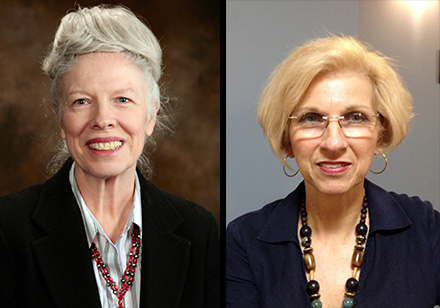FAYETTEVILLE, Ark. – The excitement of children adds to the fun and enjoyment of the holiday season, even for adults. However, anyone raising children knows they can also present special challenges as Christmas approaches.
Mardi Crandall, teaches child development courses in the Dale Bumpers College of Agriculture, Food and Life Sciences at the University of Arkansas and is part of the staff at the Jean Tyson Child Development Study Center. She and Vernoice Baldwin, executive director of educational programs at the Jean Tyson Center, offer tips for parents facing such challenges as the holiday season draws closer.
1.Consciously think about what your child is doing at the moment, and show interest.
2.Talk with them, not at them, about what they are doing, and remember that your facial expression is part of that communication.
3.When buying presents, the simplest toys have the highest play value. The more whistles, bells and batteries, the lower the play value.
“When my daughter was young, she wanted a plastic barn that made moo noises and had many little animals,” said Crandall. “Instead, I bought her a beautiful set of maple blocks. She ended up building barns—and many, many other structures that fostered more imaginary play than I could have thought.”
4.Create your own blocks for imaginary play.
“Boxes make great building blocks when stuffed with newspaper or left-over wrapping paper,” said Baldwin. “You can also create art and craft items from packaging materials.”
5.With older children, a challenge comes when they do not receive what they want. Adults need to teach children that parents cannot always afford what children want. A suggestion to teach children is inviting them to use different resources (Internet, ads, catalogues, etc.) and learn to stay within a budget while pretending to shop for someone.
“Sometimes we have to wait and sometimes we need to save,” said Crandall. “It is hard to do, but it is sometimes necessary. This is a life-long lesson we can teach by modeling the concept ourselves. When you are waiting on a purchase that you would like to make, point out that it is hard for you to wait, too, but sometimes you have to do so.”
“You can give children a calculator and a set budget amount, and tell them to buy clothes, toys, books and other items for a child of a specified age who may not have anything to start with,” said Baldwin. “This will teach them to comparison shop and make decisions on what is needed, such as gloves or a winter coat, and then balance their budget. They have to think of everything. These are all important learning opportunities.”
6.To prepare to receive new toys, have children conduct a toy inventory and donate items they no longer use.
“Children can donate out-grown toys to resale shops like the Salvation Army, Goodwill or the Potter’s House,” said Baldwin. “It’s a great way to teach them to think about others.”
7.Teach children the joy of giving by helping them make or buy appropriate gifts, wrap them and give them.
“As you do this, talk about the good feeling you have when you give to others,” said Crandall. “Openly show your joy as a giver, and your child will most likely follow your example.”
Crandall admits none of this is easy, especially when parents’ minds are filled with other details, but she says during the holidays children need their parents’ emotional presence more than physical presents.
“Give up the picture-perfect expectations,” she adds. “Children have a way of throwing curve balls at our best laid plans, and despite what the vision of sugar plums may mean to us, children often have an opposite agenda. Everyone will have more fun if parents and grandparents can let go of their visions of perfection, and just go with the flow, whatever it brings. Remaining in the moment with children takes skill and resolve.”
The Jean Tyson Child Development Study Center ranks among the top 10 percent of all childcare facilities in the nation, providing quality care and education to more than 100 children ranging in age from two months to five years. The center is also used by more than 110 U of A faculty, staff and students for academics and research.
Contacts
Mardi Crandall, instructor
human development and family sciences
479-575-5224,
Vernoice Baldwin, executive director of educational programs
Jean Tyson Child Development Study Center
479-575-4312,
Robby Edwards, director of communications
Bumpers College
479-575-4625,
